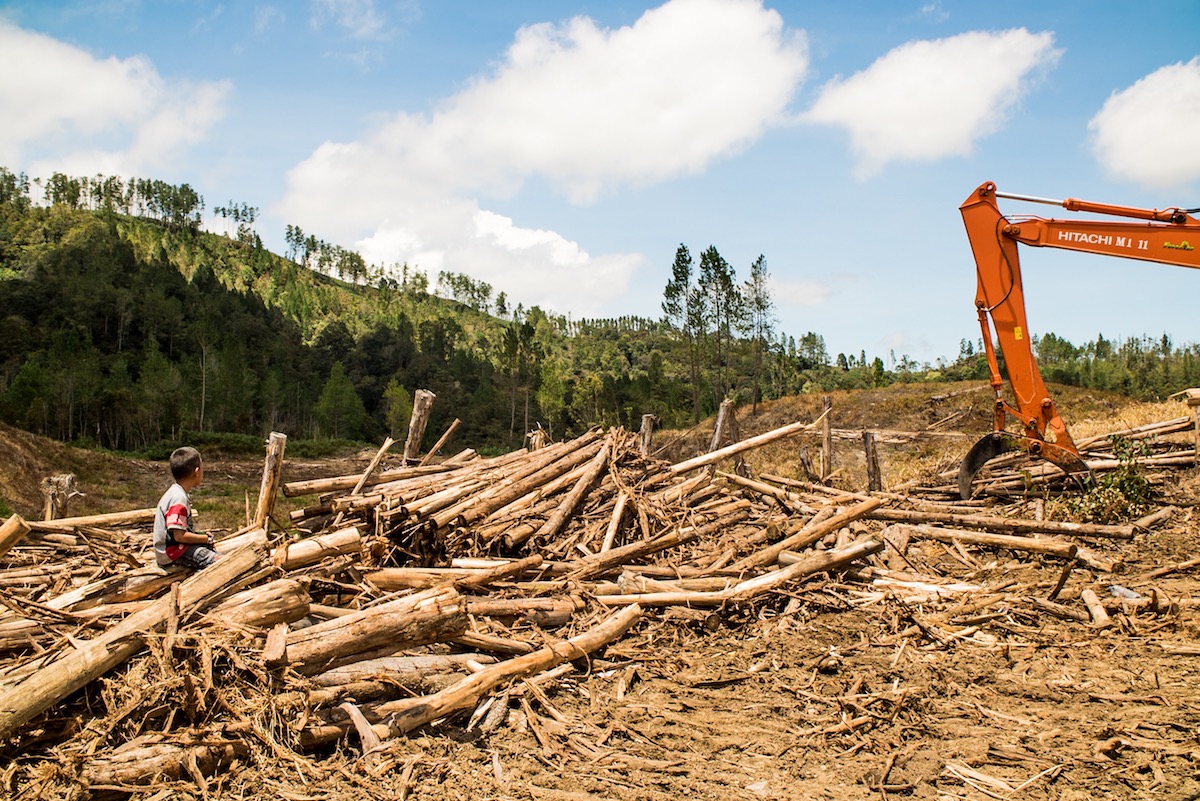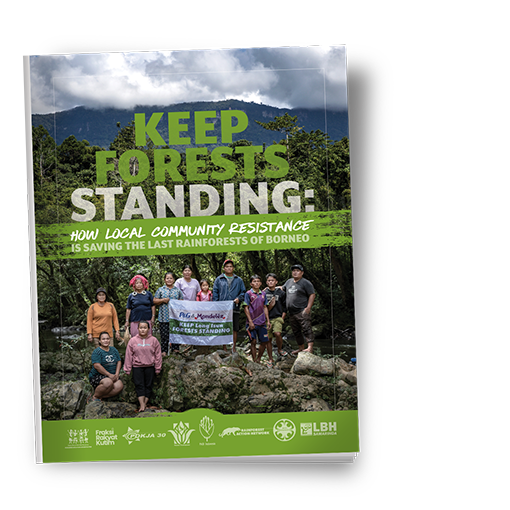These communities are on the frontlines.
Corporations are bulldozing and burning rainforests for profit: from palm oil plantations to cattle, soy, cocoa and pulpwood. At the frontlines of this destruction are local and Indigenous communities whose lands, waterways and lives are under threat.
All too often, when frontline communities assert their rights over their land and forests against corporations, they face intimidation, criminalization and violence.
Corporations are turning Indonesia’s vibrant forests and peatlands into palm oil and pulpwood plantations, but local communities are fighting back.
Years of smart, dedicated corporate campaigning have pushed many companies to make important policy commitments to “No Deforestation, No Peat, and No Exploitation” (NDPE), but corporate promises only go so far. Real change is still needed for forests, peatlands and Indigenous and local communities. That’s why frontline communities in Indonesia are standing up to demand real action.
Long Isun fights to protect Borneo’s rainforests from timber companies linked to Oreo maker Mondelēz International.
The Dayak Bahau of Long Isun rely on forests for everything, from fish and game to the variety of plants they use for food, medicine and cash crops. But their way of life is under threat as one of Indonesia’s most powerful agribusinesses — the Harita Group — threatens to log their rainforests.
Harita Group is a conglomeration of companies that supply product ingredients like palm oil to major global brands, including Mondelēz International and Procter & Gamble. It owns timber concessions covering nearly a quarter of Long Isun’s ancestral lands without the community’s free, prior and informed consent. Despite a history of criminalization, the community persists against corporate occupation of their land — some of the last intact rainforests along the Mahakam River in East Kalimantan.
The Pargamanan-Bintang Maria fight David v. Goliath-style to protect Sumatran rainforests from pulpwood producers linked to Tide maker Procter & Gamble.
How are Procter & Gamble’s Tide laundry detergent, Olay face cream and Crest toothpaste linked to communities fighting pulpwood expansion in Indonesia? P&G sources its palm oil from the same corporate giant that’s been stealing land from Batak Indigenous peoples in Sumatra, Indonesia to expand its pulp and paper operations. That makes P&G complicit in land grabs.
But many of these communities are now fighting back for their customary land rights. One such community is the Pargamanan-Bintang Maria of North Sumatra. Their extensive farming of rice, local crops and incense from benzoin trees has kept the rainforests and community healthy and intact for decades. Despite their fierce resistance to pulpwood expansion, their forests, and community, remain at risk. More than 40% of their ancestral territory sits inside a pulp and paper concession belonging to Toba Pulp Lestari (TPL).
Villagers from Lubuk Mandarsah take on forestry giant Asian Pulp and Paper (APP) over deadly violence and stolen ancestral lands.
The people of Lubuk Mandarsah village in Sumatra have lived peacefully, cultivating rice and vegetables on their ancestral lands for generations. But their day-to-day lives changed drastically in 2007 when an Asia Pulp and Paper (APP) subsidiary cut off access to villagers’ land to clear forests and build heavily-guarded pulp and paper plantations.
Resulting conflict between Lubuk Mandarsah villagers and the APP subsidiary, PT. Wira Karya Sakti, has been particularly violent, including numerous instances of intimidation and criminalization of villagers, including the tragic murder of a young farmer named Indra Pelani by company security forces. Although APP claims it has resolved tensions with Lubuk Mandarsah, the community is still seeking the return of its land and lasting peace.
The Bunin stand strong against palm oil developers at the border of the globally-important Leuser Ecosystem.
The Leuser Ecosystem is the last place on Earth where Sumatran orangutans, elephants, tigers, rhinos, and sun bears still roam in the same habitat, but illegal palm oil development has put this globally-important rainforest biome at risk. Palm oil development has also threatened Indigenous peoples, like the Bunin of East Aceh.
Years of coordinated efforts to protect Bunin ancestral lands from corporate exploitation have yielded long-overdue legal recognition, but these legal guarantees are thin, while threats and uncertainty remain — namely, in the form of palm oil producer PT. Tegas Nusantara, which continues to threaten the Bunin way of life.
Solidarity with frontline communities.
From Indonesia to the Amazon rainforest, and all across the world, frontline and Indigenous communities are fighting to have their legal rights to traditional and ancestral lands respected. They’re fighting to protect their forests, their culture and their ways of life. Indigenous communities are defending their lands for the health and vitality of everyone in the world.The lived experiences in frontline communities are the true measure of whether or not corporations are keeping their promises. Learning from their stories and following their lead, we work in solidarity with local and Indigenous communities to challenge corporate power.
Through partnering with local communities and organizations, we conduct undercover field investigations and supply chain research, challenging the corporate “green wash” with true reports from the ground, calling out bad corporate actors and holding them accountable to real and meaningful change.
Together we can hold corporations accountable.
Together, we demand more from global corporations than paper promises. We demand real and substantial change to their destructive, ‘business-as-usual’ practices.
All too often, unchecked corporate greed ignores laws, regulations, and moral imperative for maximum profit. Corporations are allowed to pass the buck, deny responsibility for the impacts of their business practices, and we are all left to pay the incredibly high price.
We say, No More. Corporations must be held accountable for their impact on rainforests, communities, and our global climate.
Join us in holding corporations Accountable


